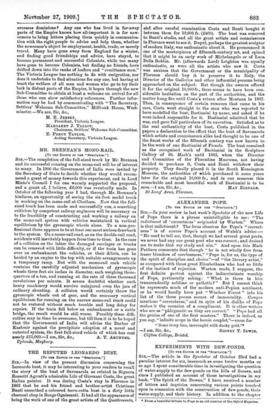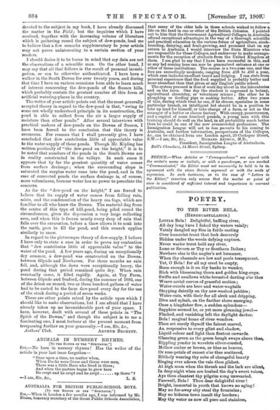EXPERIMENTS WITH DEW-PONDS.
[To THE EDITOR OP THE "SricTAToz."] Sts,—The article in the Spectator of October 23rd had a peculiar interest for me, inasmuch as some twelve months or so ago I spent considerable time in investigating the question of water-supply to the dew-ponds on the hills of Sussex, and since I published an account of those investigations in my book, "The Spirit of the Downs," I have received a number of letters and inquiries concerning various points touched upon in connexion with the construction of dew-ponds, their water-supply, and their history. In addition to the chapter
• From a beautiful tribute to Pope In an old number of the Oxford Magazine.
devoted to the subject in my book, I have already discussed the matter in the Field; but the inquiries which I have received, together with the increasing volume of literature which is gathering round the subject of dew-ponds, lead me to believe that a few remarks supplementary to your article may not prove uninteresting to a certain section of your readers.
I should desire it to be borne in mind that my data are not the observations of a scientific man. On the other hand, I may say that all that follows is the result of personal investi- gation, or can be otherwise authenticated. I have been a walker in the South Downs for over twenty years, and during that time I have on various occasions been able to learn much of interest concerning the dew-ponds of the Sussex hills, which probably contain the greatest number of this form of artificial watering-places in the country.
The writer of your article points out that the most generally accepted theory in regard to the dew-pond is that, " owing to some not wholly understood principle in its construction, the pond is able to collect from the air a larger supply of moisture than other ponds." After several interviews with practical makers of dew-ponds on the Downs of Sussex, I have been forced to the conclusion that this theory is erroneous. For reasons that I shall presently give, I have concluded that dew contributes little of appreciable value to the water-supply of these ponds. Though Mr. Kipling has written poetically of "the dew-pond on the height," it is to be noted that numbers of the ponds in the South Downs are in reality constructed in the valleys. In such cases it appears that by far the greatest quantity of water comes from surface drainage ; when the surrounding slope is saturated the surplus water runs into the pond, and in the case of concreted ponds the surface drainage is, of course, more voluminous, because water has no power to percolate the concrete.
As for the "dew-pond on the height," I am forced to believe that its supply of water comes from falling rain, mists, and the condensation of the heavy sea fogs, which are familiar to all who know the Downs. The material dug from the centre of this type of hill-pond, being piled round the circumference, gives the depression a very large collecting area, and when this is frozen nearly every drop of rain that falls over the excavation, before a thaw allows it to soak into the earth, goes to fill the pond, and this remark applies similarly to snow.
In regard to the picturesque theory of dew-supply, I believe I have only to state a case in order to prove my contention that "dew contributes little of appreciable value" to the water of the pond. A few years ago, during an exceptionally dry summer, a dew-pond was constructed on the Downs, between Glynde and Newhaven. For three months no rain fell, and, although the dews were exceptionally heavy, the pond during that period remained quite dry. When rain eventually came, it filled rapidly. Again, at Toy Farm, between Glynde and Seaford, during the summer of 1893, one of the driest on record, two or three hundred gallons of water had to be carted to the farm dew-pond every day for the use of the stock during a period of seven weeks.
There are other points raised by the article upon which I should like to make observations, but I am afraid that I have already taken up no inconsiderable part of your space. I have, however, dealt with several of these points in " The Spirit of the Downs," and though the subject is to me a fascinating one, I must forbear at the present moment from trespassing further on your generosity.—I am, Sir, &c.,















































 Previous page
Previous page